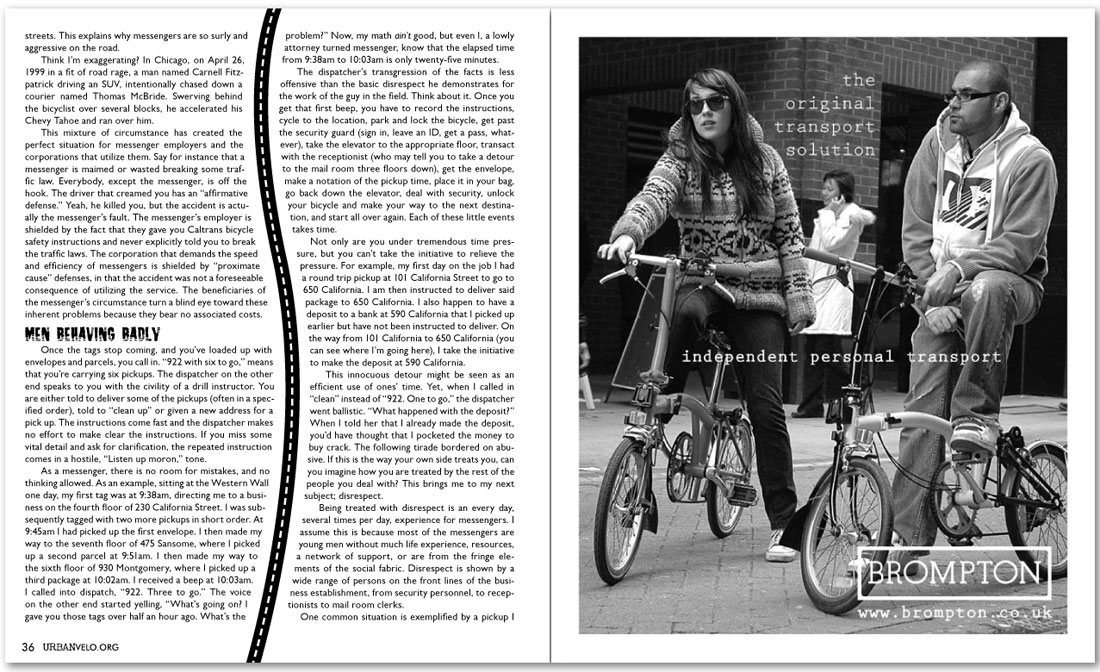streets. This explains why messengers are so surly and aggressive on the road.
Think I’m exaggerating? In Chicago, on April 26, 1999 in a fit of road rage, a man named Carnell Fitzpatrick driving an SUV, intentionally chased down a courier named Thomas McBride. Swerving behind the bicyclist over several blocks, he accelerated his Chevy Tahoe and ran over him.
This mixture of circumstance has created the perfect situation for messenger employers and the corporations that utilize them. Say for instance that a messenger is maimed or wasted breaking some traffic law. Everybody, except the messenger, is off the hook. The driver that creamed you has an “affirmative defense.” Yeah, he killed you, but the accident is actually the messenger’s fault. The messenger’s employer is shielded by the fact that they gave you Caltrans bicycle safety instructions and never explicitly told you to break the traffic laws. The corporation that demands the speed and efficiency of messengers is shielded by “proximate cause” defenses, in that the accident was not a foreseeable consequence of utilizing the service. The beneficiaries of the messenger’s circumstance turn a blind eye toward these inherent problems because they bear no associated costs.
Men Behaving Badly
Once the tags stop coming, and you’ve loaded up with envelopes and parcels, you call in. “922 with six to go,” means that you’re carrying six pickups. The dispatcher on the other end speaks to you with the civility of a drill instructor. You are either told to deliver some of the pickups (often in a specified order), told to “clean up” or given a new address for a pick up. The instructions come fast and the dispatcher makes no effort to make clear the instructions. If you miss some vital detail and ask for clarification, the repeated instruction comes in a hostile, “Listen up moron,” tone.
As a messenger, there is no room for mistakes, and no thinking allowed. As an example, sitting at the Western Wall one day, my first tag was at 9:38am, directing me to a business on the fourth floor of 230 California Street. I was subsequently tagged with two more pickups in short order. At 9:45am I had picked up the first envelope. I then made my way to the seventh floor of 475 Sansome, where I picked up a second parcel at 9:51am. I then made my way to the sixth floor of 930 Montgomery, where I picked up a third package at 10:02am. I received a beep at 10:03am. I called into dispatch, “922. Three to go.” The voice on the other end started yelling, “What’s going on? I gave you those tags over half an hour ago. What’s the problem?” Now, my math ain’t good, but even I, a lowly attorney turned messenger, know that the elapsed time from 9:38am to 10:03am is only twenty-five minutes.
The dispatcher’s transgression of the facts is less offensive than the basic disrespect he demonstrates for the work of the guy in the field. Think about it. Once you get that first beep, you have to record the instructions, cycle to the location, park and lock the bicycle, get past the security guard (sign in, leave an ID, get a pass, whatever), take the elevator to the appropriate floor, transact with the receptionist (who may tell you to take a detour to the mail room three floors down), get the envelope, make a notation of the pickup time, place it in your bag, go back down the elevator, deal with security, unlock your bicycle and make your way to the next destination, and start all over again. Each of these little events takes time.
Not only are you under tremendous time pressure, but you can’t take the initiative to relieve the pressure. For example, my first day on the job I had a round trip pickup at 101 California Street to go to 650 California. I am then instructed to deliver said package to 650 California. I also happen to have a deposit to a bank at 590 California that I picked up earlier but have not been instructed to deliver. On the way from 101 California to 650 California (you can see where I’m going here), I take the initiative to make the deposit at 590 California.
This innocuous detour might be seen as an efficient use of ones’ time. Yet, when I called in “clean” instead of “922. One to go,” the dispatcher went ballistic. “What happened with the deposit?” When I told her that I already made the deposit, you’d have thought that I pocketed the money to buy crack. The following tirade bordered on abusive. If this is the way your own side treats you, can you imagine how you are treated by the rest of the people you deal with? This brings me to my next subject; disrespect.
Being treated with disrespect is an every day, several times per day, experience for messengers. I assume this is because most of the messengers are young men without much life experience, resources, a network of support, or are from the fringe elements of the social fabric. Disrespect is shown by a wide range of persons on the front lines of the business establishment, from security personnel, to receptionists to mail room clerks.
One common situation is exemplified by a pickup I
